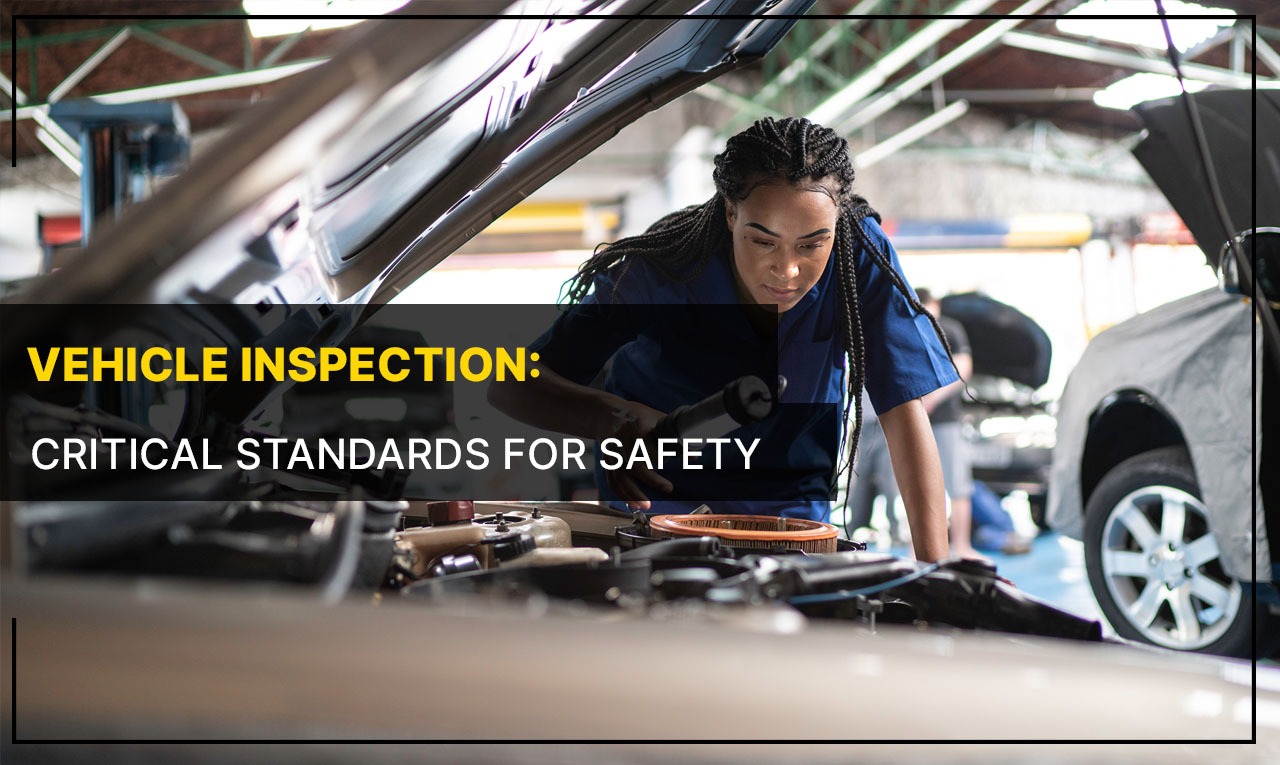
Just like humans require regular checkups, vehicles benefit from comprehensive inspections, too. Whether it's ensuring vehicle inspection for registration, confirming a used car's condition, or assessing post-accident damage, Vehicle Inspection plays a critical role in guaranteeing the safety and performance of our automobiles. But what exactly is a car inspection, when is it necessary, and how are these evaluations conducted? This blog delves deep into Vehicle Inspection, unveiling their significance and methods.
What’s In This Blog?
- What Is Vehicle Inspection?
- When Is a Vehicle Inspection Necessary?
- What Are the Methods of Vehicle Inspection?
- Beyond Standards: The Value of Regular Inspections
- Finding the Right Inspection
What Is Vehicle Inspection?
A vehicle safety inspection involves thoroughly examining a vehicle's various components, assessing their functionality, condition, and compliance with safety regulations. Qualified inspectors meticulously check everything from the engine and brakes to the bodywork and tires, documenting their findings in a detailed report.
Engine:
The ASE certified mechanics will check the engine's condition, looking for signs of leaks, unusual noises, or excessive smoke from the exhaust. They may also check fluid levels, belts, and hoses for wear or damage.
Brakes:
The braking system is crucial for vehicle safety. Inspectors will examine brake pads, rotors, callipers, and brake lines for wear and proper function. They may also test the braking performance through road tests or using specialized equipment.
Suspension and Steering:
A thorough inspection of the suspension and steering components helps ensure stability, handling, and overall vehicle control. Inspectors will look for worn or damaged parts, such as shocks, struts, tie rods, and ball joints.
Electrical System:
This includes checking the battery, alternator, starter motor, and electrical wiring for any faults or malfunctions. Inspectors may also test various electrical components, such as lights, indicators, and windshield wipers.
Safety Features:
Inspectors will verify the functionality of safety features like seat belts, airbags, and windshield wipers. They'll ensure these features are in good working order and compliant with safety regulations.
Body and Frame:
Examination of the vehicle's body and frame helps identify structural damage, rust, or corrosion. Inspectors will also check for proper alignment of body panels and doors, which can affect safety and aerodynamics.
Exhaust System:
Inspectors will conduct vehicle inspection Brisbane on the exhaust system for leaks, damage, or excessive emissions. This includes checking the catalytic converter, muffler, exhaust pipes, and O2 sensors for any issues.
Tires and Wheels:
The condition of tires and wheels significantly impacts vehicle safety and performance. Inspectors will check tire tread depth, sidewall condition, and tire pressure. They'll also inspect wheels for damage and proper alignment.
Fluids:
Inspectors will examine fluids such as engine oil, coolant, transmission, and brake fluid to ensure proper levels and cleanliness. Any leaks or contamination could indicate underlying issues that need attention.
Emissions and Environmental Compliance:
Inspectors may conduct emissions tests depending on local regulations to ensure the vehicle meets environmental standards. This typically involves measuring exhaust emissions to check for pollutants.
When Is a Vehicle Inspection Necessary?
While seemingly straightforward, the question of "when" requires understanding diverse scenarios that trigger the need for inspection:
- Expired or Renewing Policies:
Many insurance companies mandate a vehicle inspection report before issuing or renewing policies, especially for comprehensive coverage. This ensures the insured vehicle adheres to safety standards and minimizes risks.
- Change in Ownership:
Buying or selling a used car often involves pre-purchase inspections, protecting both parties by providing an unbiased assessment of the vehicle's condition.
- Upgrade to Comprehensive Plans:
Switching to a more comprehensive insurance plan might necessitate mobile safety inspections to verify the vehicle's value and condition.
- Addition of Accessories or Modifications:
Significant modifications like aftermarket installations or lift kits often require inspections to ensure they comply with safety regulations and don't compromise the vehicle's performance.
- Post-Accident Inspection:
After an accident, regardless of severity, inspections are crucial to assess damage, identify potential safety hazards, and determine repair needs.
What Are the Methods of Vehicle Inspection?
Several inspection methods cater to different situations and regulations:
- Visual Inspection:
This initial, non-intrusive method involves a thorough visual examination of the vehicle's exterior and interior, checking for noticeable signs of damage, wear, or leaks.
- Undercarriage Inspection:
Using a lift or pit, inspectors scrutinize the vehicle's underside, assessing the condition of suspension components, drivetrain, and exhaust system.
- Fluid Level Checks:
Engine oil, brake fluid, coolant, and other vital fluids are checked for proper levels and signs of contamination.
- Diagnostic Scans:
Modern vehicles rely heavily on computer systems. A diagnostic scan using specialized equipment identifies any electronic faults or performance issues.
- Test Drive:
Taking the vehicle for a test drive allows inspectors to evaluate handling, braking, and overall performance in real-world conditions.
- Additional Tests:
Depending on the inspection's purpose, specific tests like emission checks, headlight alignment tests, or pressure checks might be conducted.
Beyond Standards: The Value of Regular Inspections
While mandated inspections are crucial, proactive car owners understand the additional benefits of regular checkups. Mobile roadworthy Brisbane evaluations help identifies minor issues before they escalate into costly repairs, ensuring smooth operation and maximizing your vehicle's lifespan. By prioritizing regular inspections, you prioritize safety, protect your investment, and contribute to a safer driving environment for everyone.
Further Reading:
Finding the Right Inspection
When seeking a vehicle inspection, look for certified, reputable service providers who adhere to established industry standards. Utilize resources like "vehicle inspection near me" searches and online reviews to identify qualified professionals. Remember, transparency is critical - inquire about the inspection process, methodology, and expected cost beforehand. Feel free to request a detailed vehicle inspection form outlining the checks performed and the resulting report.
By understanding the critical role of vehicle inspection standards and choosing the proper methods, you empower yourself to make informed decisions, guarantee the safety of your vehicle, and ultimately enjoy a smoother and more secure driving experience. Remember, a well-maintained car is safe, and regular inspections are an essential part of the equation.
OUR POST
- How Much Does A Roadworthy Cost QLD? Mobile Roadworthy Services Are Described!
- What Is A Roadworthy Certificate & All You Need To Know About It!
- What Is Checked In A Roadworthy Certificate QLD?
- When Do You Need A Roadworthy Certificate QLD?
- Selling A Car Without Roadworthy: What You Need To Know
- Gas Certificate Qld: How Long Does A Gas Certificate Last?
- What Happens If You Fail A Roadworthy? Let’s Know From The Experts
- How To Buy A Used Car – Top Tips And Tricks
- Mastering the Art of Car Washing: A Comprehensive Car Washing Guide for Beginners
- Mobile Roadworthy Inspection Checklist: Ensuring Vehicle Safety
- The Power of Mobile Safety Certificates: Ensuring Vehicle Safety
- What if my car does not pass a roadworthy inspection?
- Stop! You're Cleaning Your Car Headlights Wrong!
- How Long Does A Roadworthy Last – All You Need To Know
- How Long Do Car Tyres Last?
- How to choose the perfect mobile roadworthy service provider?
- The Importance of Mobile Roadworthy Services: Why You Need Them for Your Vehicle
- Understanding the Mobile Roadworthy Certificate Process: A Comprehensive Guide
- How To Winterize Your Car: A Comprehensive Guide to Cold-Weather Vehicle Maintenance
- Key Benefits of Mobile Roadworthy vs Traditional Roadworthy
- The Importance of Mobile Roadworthy Inspections
- Mobile Roadworthy Services: Navigating Brisbane's Roads with Confidence and Convenience
- The Critical Role of Vehicle Inspection Standards: Ensuring Safety and Smooth Rides
- How Long Does A Roadworthy Test Take?
- Free Rego Check: Peace of Mind Across Australia
- Mobile Roadworthy Questions & Answers
- 10 Everyday Roadworthy Inspection Failures In Queensland
- What Are The Uses of a Mobile Roadworthy Certificate?
- Pre Purchase Inspection Vs. Roadworthy Certificates
- What to Expect During a Mobile Roadworthy Inspection?
- Why Mobile Roadworthy Services Are a Time-Saving Solution
- How To Prepare For A Roadworthy Inspection?
- A Comprehensive Guide to Prepare Your Vehicle for Mobile Roadworthy Inspection
- Mobile Roadworthy Inspection Trends and A Look at the Future of Vehicle Safety
- Everything You Need to Know About Mobile Roadworthy Inspection Timeframes
- When to Book a Mobile Roadworthy Inspection in Brisbane?
- Step-by-Step Process to Secure Your Car Roadworthy Certificate in Brisbane
- How the Future of Mobile Roadworthy Services is Shaping the Tomorrow of Vehicle Inspections?
- How Often Should You Schedule a Mobile Roadworthy Inspection in Brisbane?
- Learn the Basics of a Mobile Roadworthy Inspection
- Top 5 Reasons to Choose a Mobile Roadworthy Certificate Service Over a Workshop
- Do You Need a Roadworthy Certificate to Sell a Car in Brisbane?
- What Happens After Roadworthy Certificate Expiry in Brisbane?
- Why Car Roadworthy Services in Brisbane Are Essential for Vehicle Owners?
- Why Choose a Mobile Roadworthy Over a Workshop?
- How to Get a Roadworthy Certificate Fast in Brisbane?
- How Same-Day Mobile Roadworthy Certificates Work?
Copyright © 2021 Mobile Roadworthy Certificate Brisbane | Astute Automotive. All Rights Reserved. Powered by: iSquad.




